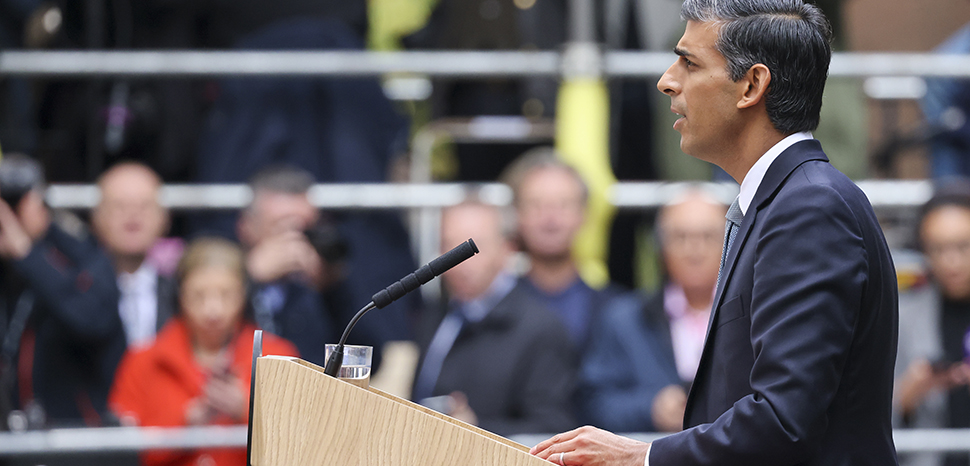Alexander Brotman

The 44-day tenure of Liz Truss and the arrival of Rishi Sunak to 10 Downing Street comes at a perilous time for Britain’s economy and global position. Inflation is at an all-time high, wages and living standards have fallen significantly below the UK’s counterparts in Western Europe, and threats to the union with Scottish independence and the potential reunification of Ireland all loom large. In addition, the near-record support for the Labour Party suggests an uphill climb for the Conservatives ahead of the next general election to be held by January 2025. Thus, Prime Minister Sunak is unlikely to strengthen the UK’s position in Europe or in global affairs but to more carefully manage the terms of its continued retrenchment.
As a principled Leaver who has been consistent in his Brexit positions, Sunak may find a more receptive audience in Brussels as the UK continues to manage its withdrawal from the EU. The early readout from his call with European Commission President Ursula von der Leyen suggests a less combative approach to the Northern Ireland Protocol than Truss, and a desire to renegotiate without succumbing to legal disputes over individual provisions. However, given that Sunak’s tenure is likely to be short and his political legitimacy already in question, he will likely have an uphill battle in unifying divisions within the UK and projecting confidence to his partners across the channel.
To highlight the political and economic instability Britain has faced in 2022, one of its most storied publications, The Economist, has now likened the UK to Italy. This is due to the UK’s low growth, productivity, and decline in real wages, as well as its many coalition governments and prime ministers. Both nations have had four prime ministers since 2015, and the UK has had four chancellors of the exchequer since July of this year. The image of Britain as a stable political and investment climate in Europe has been severely tested, with the lack of policy cohesion across governments or even from minister to minister representing a significant risk.
Since the Brexit vote in 2016, foreign investment, immigration, and exports to the UK have all declined, reducing the size of the UK’s economy by several percentage points. In its bid for greater sovereignty since the Brexit vote, the UK faces a battle between opening up to outside talent and new trading partners while enforcing the terms of its withdrawal that are inevitably defined by a narrower and more localised vision of the state. The UK is now one of the poorest countries in Western Europe, as noted by Derek Thompson in The Atlantic, choosing “austerity over investment, and a closed economy over openness to the world.” The Conservative Party has been linked to austerity since Prime Minister David Cameron and his chancellor George Osborne came to power in 2010. In a time of rising inflation and deep economic pain for millions of Britons, Sunak is unlikely to earn the nation’s trust overnight. However, if he begins to open Britain up again by promising a level of nationwide growth that helps break England’s north-south divide and stubborn productivity puzzle, he would be a competitive candidate for the Conservatives in the next election.
Sunak’s rise shows both the openness and dominance that the UK has exhibited across the world for centuries, while also reminding voters of the entrenched virtues in politics of a privileged elite that has seemingly unfettered access to power. In that sense, Sunak is quintessentially British, with roots drawn from the jewel in the crown of the British Empire and educated within the traditional upper-class institutions that have come to define British political life. As an establishment figure, Sunak’s greatest challenge is likely to be in ensuring that the Conservative Party embraces meritocratic values as a recipe for success and openness in the global economy. The Conservatives have now spent over a decade in power and their policy positions are naturally not as forward-looking as the opposition which has had time to reconstitute and reanimate its front and back benches.
Sunak suffers from an immediate crisis of legitimacy from the perspective of the opposition, including Labour, and the Scottish National Party, which has come to view Westminster as fundamentally antidemocratic and acting against Scottish national interests. Given these divergences at the heart of the union, there are likely to be few immediate positive metrics from which to measure success in a Sunak government. Sunak’s may be a steady hand, but he is leading an unsteady country with an in-tray of unenviable proportions. While the UK is not destined to suffer continuously now that it has left the EU, leaders with the foresight and political acumen to engage constructively with all of Britain’s neighbours are desperately needed. As such, Sunak’s primary role will be in uniting the Conservatives in preparation for opposition, helping them to return to Downing St with a new slate of candidates untarred by the policies of Brexit, but still clear-eyed as to the consequences and opportunities that it represents.
No comments:
Post a Comment